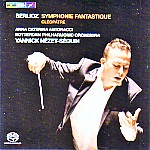The classical record industry is nothing if not predictable. Every technological blip and sputter in the name of “progress” becomes an excuse to rush out and re-record the basic repertoire. It happened with 78s to LPs, mono to stereo, stereo to quad (what a success that was!), LP to CD, and analog to digital, and now digital stereo to SACD (and Blu-Ray, and DVD Audio, etc, etc). Labels would do better simply to make great recordings.
Berlioz’s Symphonie fantastique often falls victim to this trend, because it has all the trappings of a “sonic spectacular”: the glittering harps in the second movement; the thumping bass drum, crashing cymbals, and biting brass in the March; and of course those screeching woodwinds and super-cool funeral bells in the finale. Remember that horrendous early digital LP featuring the Utah Symphony on two discs, the second of which offered the last two movements twice because those were the ones that would wear out first?
The problem is, the Symphonie fantastique isn’t really a “sonic spectacular” at all; it can be, but only when its challenges and opportunities as one of the most difficult pieces in the entire repertoire are met head-on. Its range of feeling is Beethovenian, the problems it poses in terms of pacing are Schubertian. It gets more horrible recordings and performances than probably any other major symphony, save possibly the Franck D minor.
Yannick Nézet-Séguin’s performance isn’t bad, but it doesn’t begin to scale the heights of passion and intensity so evident from a mere glance at the score. This is an effeminate performance–dainty, even cute in the first movement, and graceful in the second (save for a too-fast coda). The lack of symphonic weight early on tends to make the Scène aux champs drag due to lack of contrast.
The March to the Scaffold is cheerful, jaunty, underplayed, and not the slightest bit menacing, never mind grotesque. In the finale, tinny bells, less than imposing brass (again), and a decided preference for high registers in a work already weighted in that direction makes the piece sound more like a cartoon soundtrack than it should. This is a performance purged of terror, of all of the work’s hallucinatory qualities. The conductor has a definite conception; what it has to do with Berlioz’s is an open question.
Cléopâtre is a wonderful piece of early Berlioz, and as an accompanist Nézet-Séguin can’t be faulted. Anna Caterina Antonacci, though, is another story. Although she makes some lovely sounds when singing softly, the voice quickly turns squally and tremulous under pressure. It’s a shame, really, because her opening phrases promise so much more than she ultimately delivers. The sonics, typically, are very good, the playing as such is excellent (for which Nézet-Séguin deserves credit too), but BIS would do better to stick to its mandate to explore interesting, unusual works, unless of course it has something truly excellent in the offing in the standard repertoire. The multi-channel format is no excuse. No one wants to be sonically surrounded by mediocrity.
































